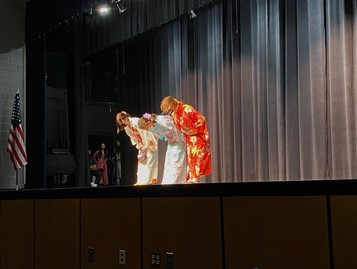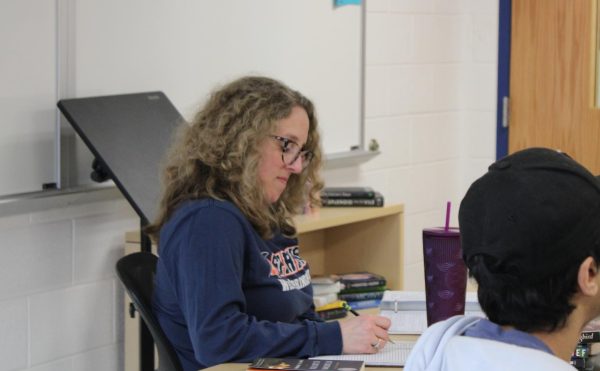AAPI community celebrates its rich culture

Photo courtesy of Olivia Gondek
Through events such as International Night, Asian American and Pacific Islander culture is recognized in the school community. Programs like this help students in these minorities feel seen.
This month, Asian Americans and Pacific Islanders are recognized for their diversity and heritage and commemorated for the struggles they’ve faced in the United States.
Asian American and Pacific Islander (AAPI) Heritage Month aims to celebrate the history and customs of those descending from Asia and the many islands of the Pacific. May was chosen to honor Asian Americans and Pacific Islanders because of two significant dates in American history: May 7, 1843, when the first Japanese immigrants arrived in the United States, and May 10, 1869, when the Transcontinental Railroad, primarily built by Chinese immigrants, was completed.
“I’m pretty proud of [my culture]. I try to talk about it to a lot of other people who don’t know about it,” said freshman Emily Choi, who is Korean-American.
Asian Americans make up 14 percent of the student body as of the 2020-21 school year. Over 19 percent of FCPS students are Asian Americans or Pacific Islanders.
“We have a very diverse culture here. I like it,” said math teacher Jae Lee, who is of Korean descent. “A lot of Asian Americans who go to this school also feel at home.”
The term “Asian American and Pacific Islander” encompasses millions of Americans who descend from vast regions of the world. AAPI Heritage Month is an umbrella term which includes people from a wide range of backgrounds and cultures. Such a broad definition may also mean the term “AAPI” is not completely inclusive.
Asian Americans and Pacific Islanders descend from 48 Asian countries, 15 Pacific island nations, and three U.S. Pacific territories. The people being celebrated this month have roots ranging anywhere from the Middle East to Hawaii. The term “Asian,” however, is most associated with East Asian nations, such as China, Korea, and Japan.
“There are just so many Asian countries. It’s kind of difficult to represent them all. As long as we recognize that each person is different, they bring their own culture and make the school a better place,” said Lee.
Stories of hate crimes against Asian Americans have overtaken the news in recent years. With the COVID-19 pandemic came paranoia and prejudice, which targeted innocent people all over the country. The shootings in Atlanta and the numerous cases of assault in New York are just a fraction of the discrimination that has taken place since the pandemic began.
“It’s honestly so disgusting that people blame a race for one virus,” said Choi. “It’s not about a person’s race. I don’t know why people are hating [on Asians].”
Choi recalled the racial slurs she was called and the blame she faced over other students’ family members contracting COVID-19 when she was in seventh grade at the pandemic’s beginning.
Hate crimes against Asian Americans skyrocketed 339 percent nationwide last year, according to NBC News. Major cities such as New York, San Francisco, and D.C. have experienced an appalling rise in reported anti-Asian hate crimes.
“People are angry right now,” said Lee. “When somebody attacks you, [it’s because] it’s always easier to be angry. It takes more determination, more patience, just to be open-minded and not to be angry.”
Still, the fight for equality persists. Movements such as Stop AAPI Hate, formed in 2020, aim to prevent anti-Asian hate crimes and advance equality for Asian Americans and Pacific Islanders through research, advocacy, and education. By raising awareness about the discrimination Asian Americans and Pacific Islanders face—and through others becoming willing to listen and communicate with people of these communities—the country can be more inclusive and strive to achieve the increased representation and recognition AAPIs are fighting for.
“Be more open and help other Asians,” said Choi. “If there is someone who is being targeted because of their race, I think you should stand up for them.”





